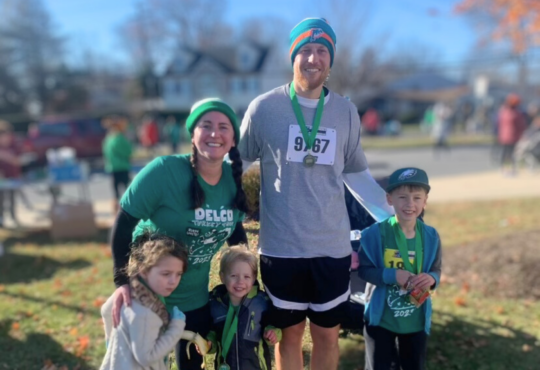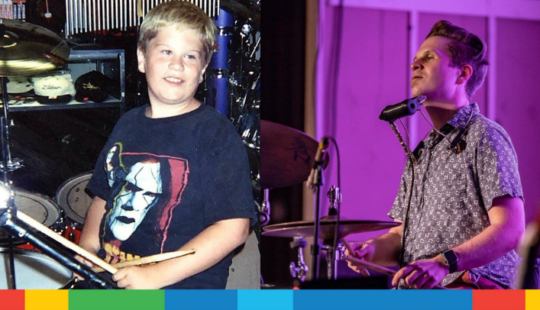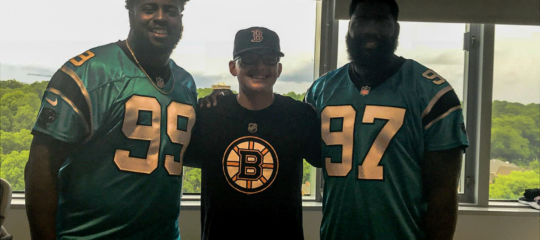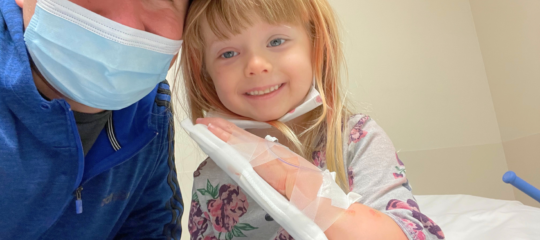
Zack Pomerleau: the Musician Behind the Diagnosis

Zack and his family always knew something wasn’t right. Growing up, he struggled with motion sickness, making it difficult for him to ride in cars or on a school bus. He would wake up nauseous and suffer from migraines to the point where he would have to miss school. In addition, one of his eyes started turning in. While his parents knew something was wrong, it took years to discover the cause of Zack’s symptoms.
When he was six years old, Zack went to the doctor with his mother to explore the cause of these recurring symptoms. While surgery corrected his eye problems, he was told his nausea and migraines were due to issues with his stomach. As a nurse, Zack’s mom was displeased with the treatment prescribed by the gastroenterologist and advocated for her son until he was asked to do a brain scan. The scan showed Zack had a brain tumor the size of a quarter in the fourth ventricle of his brain stem and was diagnosed with pilocytic astrocytoma at age eight.
Zack’s tumor on his brain stem could have been there his entire life, but it was crucial for it to be removed right away as it was pushing on his brain stem. His first surgery was unable to remove the entire tumor without damaging his brain. After regrowth occurred, a second surgery was done to remove the entirety of the brain tumor.
Although Zack’s subsequent brain scans never showed any regrowth, his tumor left a lasting impact – a reality that’s all too common for pediatric brain tumor survivors.
Children with brain cancer can’t wait another week, another day, another minute for your support. When you donate to the Pediatric Brain Tumor Foundation, you help fund life-changing research and provide families with the resources and support they need. Don’t let pediatric brain cancer steal another future.
It wasn’t until Zack attended Camp Sunshine that he met other kids with the same exact diagnosis as him. He met a lot of friends and caring adults who understood what he was going through and felt the same way. At the same time, he struggled with his identity as someone with a life-threatening illness.
“Even if you’re not sick anymore, you’re still going through it. Growing up I struggled with trying to be ‘normal.’ At home, I felt like I was only seen as ‘the sick kid.’ As a survivor, I lived with guilt and questioned why my friends with similar diagnoses didn’t make it,” Zack says.
While balance issues caused by his tumor kept Zack from participating in what he described as “typical kid activities” like riding a bike or playing sports, Zack found refuge in music. A fearless kid who loved discovering new things, he learned how to play the harmonica, drums, and guitar. Inspired by his favorite band KISS, he continued to learn and grow throughout his childhood and into adulthood. At age 28, Zack now works as a professional musician for the blues band Doug Deming and the Jewel Tones. He’s had the opportunity to tour the United States and Europe as a drummer and harmonica player.
Although his brain tumor diagnosis seems like ancient history to him, the experience has followed Zack throughout his life and shaped his experiences. He never dreamed he would be able to be a professional musician as a child going through treatment, and he wants others who have walked a similar journey to know it’s possible to be successful and pursue their dreams.
“A pediatric cancer diagnosis can have a huge impact on a child’s life, but it does not mean they’ve lost their potential or that it’s the only thing that defines them. As a child I was seen as the sick kid who had talent, instead of just a talented kid. My illness had nothing to do with my talent. While my diagnosis is a part of my story that’s given me my perspective today, my talent and love for music are what I want to be known for.”
Once a patient finishes treatment for a childhood brain tumor, the journey has only begun. Survivors need to know what to do to stay healthy, keep health insurance as they get older, thrive in school, find a job, and navigate life after treatment ends. The Pediatric Brain Tumor Foundation equips survivors and family members with information about navigating post-treatment life and a community of support they can turn to at any point on their journey.
Learn more about PBTF’s resources for pediatric brain tumor survivors and their families and how you can help more children thrive: www.curethekids.org/stay-connected.
Related Stories


Brayson’s Incredible Journey: From Brain Tumor Survivor to NFL Equipment Manager and Mentor

Living with a Glioma: Eight-Year-Old Mackensie is an Inspiration
Mackensie's journey began in early 2018, just before her second birthday. Now an energetic eight-year-old third grader in Las Vegas, she has faced a path filled with medical challenges, surgeries, and treatments—facing each with remarkable courage and positivity.
Related Updates
Getting families where they need to be without worrying about the cost of transportation.
Pediatric Brain Tumor Foundation and Uber Partner to Provide Travel Credits for Families Navigating Challenges of Pediatric Brain Tumor Diagnosis
The Pediatric Brain Tumor Foundation (PBTF) and Uber are joining forces to provide essential support for families navigating the challenges of pediatric brain tumors.
Accelerating Kids' Access to Care Act: Improving Healthcare for Children Across State Lines
The Accelerating Kids’ Access to Care Act, passed the U.S. House of Representatives on September 17 to improve children’s access to essential health care, while eliminating administrative burdens for providers and states.

